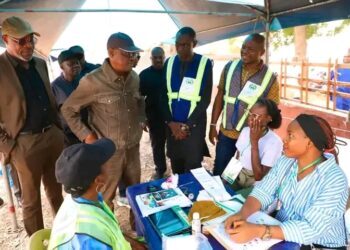This week, Filomena Leo found herself reflecting on her late husband, William “Billy” Leo, and the impact he had on their community. As a former mayor of La Joya, a small town in the Rio Grande Valley, and Hidalgo County clerk, Billy Leo dedicated his life to public service and civic engagement. His legacy includes a strong emphasis on absentee voting, which he championed since the mid-1980s.
To enhance voter turnout, Billy Leo employed campaign workers to assist elderly residents in casting their votes by mail. These workers became known locally as “politiqueras.” However, Leo distanced himself from this label due to its negative connotations, particularly regarding vote-buying practices. “He was very clear with those that helped him get the vote out — he paid them for their time, but never for the votes themselves,” Filomena shared.
In recent years, the mobilization of campaign workers to aid elderly and disabled voters has faced scrutiny, leading to increased legislation aimed at tightening mail-in voting regulations. This movement gained momentum after unverified claims of voter fraud emerged from former President Donald Trump and his allies following the 2020 election. Consequently, Texas enacted Senate Bill 1, which prohibits local election officials from sending unsolicited mail-in ballot applications, even to those who qualify automatically. The law also imposes new requirements for individuals assisting voters, mandating them to disclose their relationship to the voter.
Last week, Texas authorities executed search warrants at the homes of several individuals in connection with an ongoing “election integrity investigation” led by Attorney General Ken Paxton. Reports indicate that the investigation targets allegations of illegal vote harvesting by a known political figure in Frio County. This practice involves collecting completed mail-in ballots from various voters. Those whose homes were searched, including Democratic candidate Cecilia Castellano and former Bexar County Democratic Party chair Manuel Medina, have denied any wrongdoing.
The news of the raids sparked widespread attention, particularly after a prominent Latino advocacy group accused Paxton of attempting to intimidate voters to influence an upcoming state House race in favor of Republicans. Allegations of vote harvesting often resurface after elections in the Valley, a region known for its contentious political landscape.
In 2018, the city of Mission became embroiled in a legal battle over election results, where former Mayor Norberto “Beto” Salinas accused his opponent of bribery and illegal voting practices. Although a judge initially ruled the election invalid, the decision was later overturned, allowing the opposing candidate to retain the office.
Mission attorney Rick Salinas, who represented his father in the election dispute, attributes the decline of local politics to ballot harvesting. He asserts that many current officeholders are products of this underground movement. In contrast, Gilberto Hinojosa, chair of the Texas Democratic Party, contends that there was no evidence of such practices in the O’Caña case.
As both parties continue to clash over election integrity, Hinojosa claims that investigations into alleged election fraud tend to focus disproportionately on Latino and Democratic strongholds like the Rio Grande Valley. He believes that Paxton’s actions aim to intimidate traditionally Democratic voters.
The line between lawful assistance for elderly voters and illegal practices can be blurry, especially with evolving laws. Political scientist Alvaro Corral from the University of Texas Rio Grande Valley notes that perceptions around voter assistance have shifted significantly, particularly since the implementation of SB 1. He warns that the ongoing investigation may deter voter engagement efforts within Latino communities, leading to increased hesitance among election officials to provide essential support.











